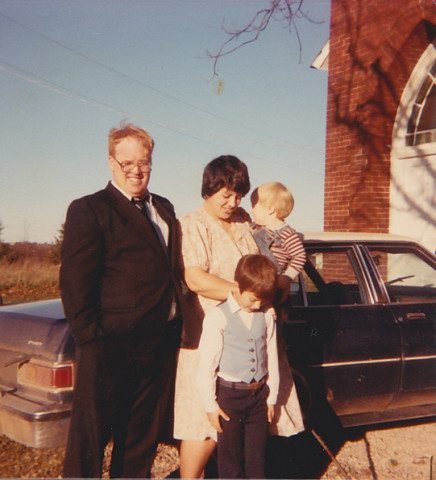
The Black Collar Crime Series relies on public news stories and publicly available information for its content. If any incorrect information is found, please contact Bruce Gerencser. Nothing in this post should be construed as an accusation of guilt. Those accused of crimes are innocent until proven guilty.
In 2023, Daniel Merrick, pastor of Congregation Yahshua Messiah Gathering, a Messianic Jew congregation in Smethport, Pennsylvania, and a Christian musician was charged with 570 counts of child pornography involving indecent contact, second-degree felonies; 316 counts of child pornography involving nudity, third-degree felonies; and one count of criminal use of a communications facility, a third-degree felony.
Merrick told law enforcement that he had an “addiction,” and only started looking at child porn because his wife wouldn’t have sex with him. Merrick called his “addiction” a curiosity.
The Olean Times Herald reported:
A Christian musician, pastor, and former Bradford store owner is in McKean County Jail, charged with more than 880 felony counts of child pornography.
Daniel W. Merrick, 64, of 858 Route 446, Smethport, is charged with 570 counts of child pornography-involving indecent contact, second-degree felonies; 316 counts of child pornography-involving nudity, third-degree felonies; and one count of criminal use of a communications facility, a third-degree felony.
According to the criminal complaint, State Police Computer Crimes received a CyberTip from Synchronoss Technologies, which is Verizon Cloud.
Between July 8 and Aug. 10, Synchronoss became aware of eight images and one video of child pornography involving indecent contact and one image of child pornography involving nudity, all of which had been uploaded to Synchronoss’ infrastructure.
Synchronoss provided to police the cell phone number which uploaded the images; the phone was registered to Merrick, the complaint stated.
On Jan. 9, Trooper Robert Whyel with the state police computer crimes unit served a search warrant for the content on the Verizon Cloud account for that phone number. The results included 178 additional images of child pornography involving indecent contact and 139 involving nudity. The images were saved on a Samsung Galaxy S21 FE 5G; there were numerous photos of Merrick on the account as well, the complaint stated.
On Feb. 10, a search warrant was executed on Merrick’s residence, and Whyel spoke with Merrick on the scene. He told the trooper that he “began viewing pornography due to his wife refusing to be intimate with him,” the complaint stated, which Merrick said led to a “two-month curiosity in child pornography.”
The complaint read, “The curiosity never entered the real world and was only a fantasy.”
He told police that he had an addiction and would seek help, the complaint read.
Reviewing Merrick’s phone, the trooper found 383 images of child pornography involving indecent contact and 176 involving nudity, including an image that was located on the CyberTip, according to the complaint.
Merrick was arraigned Friday before District Judge William Todd in Smethport. He was jailed in lieu of $20,000 bail. A preliminary hearing was scheduled for March 9.
….
According to Merrick’s website, he holds a Ph.D., is a singer, musician, author, preacher, pastor and composer. He completed Bible college and went into the U.S. Army in 1979 serving in active duty, the reserves and the National Guard until 2004. The site indicated that Merrick is now the pastor of a Messianic Jewish congregation in Bradford and has a weekly show on The Now Network Christian Television.
Merrick’s Spotify profile says:
Pastor of Congregation Yahshua Messiah Gathering, a messianic Jewish followship, R. Capt. Daniel W Merrick PhD hosts “Faith Radio – The Latter Rain Chronicles” on Anchor FM and “Yah’s Way TV” on The Now Network Christian Station world wide. Dan completed his first Album in 1993 entitled “Aliyah” with 17 songs which featured “Like Stephen” which charted on the “CCM Countdown with Bob Sour” on Christian Radio Stations as a top 40 in 1994. Dan was born in Cleveland Ohio and raised on “church music” singing in the choir and as a teen was in the gospel singing group “The Teen Revivers” at Aspinwall Church of God Mountain Assembly. The group opened for the singing Rambo’s in the 1970’s in Cleveland. Dan grew up listening to Al Jolson, his dad’s favorite artist from WW2 era 1900’s who was the star of the first talking (sound) movie “The Jazz Singer” in 1929. Dan began composing music in High School and after having a few songs stolen, common in the industry, in 1987 copyrighted his first song. Dan has appeared on CTV, TCT TV and has weekly shows on The Now Network entitled “Yah’s Way TV” which broadcasts to 236 million people syndicated on Cable and Statilite TV Stations in Europe, USA, Africa, Middle East, Israel and via apps online to billions. Dan’s music is a collection of styles from Rock, Jazz, Gospel and Country with a stong Classical influence. Dan is the Son of “Lowes Girl” Fox Pin-up Model and Advertising Artist Laura Sloan Merrick Aka “Lolly” cousin of Jimmy Stewart.
In August 2024, Merritt was sentenced to 46 to 92 months in state prison followed by three years of probation.
A Pennsylvania pastor has been sentenced after police found him to be in possession of hundreds of images and videos of child pornography.
On Tuesday, August 12, the McKean County District Attorney’s Office announced that Daniel Merrick, a pastor in Smethport, was sentenced for possessing nearly 700 images and videos of child porn after attempting to withdraw a plea agreement.
Merrick claimed he was in possession of the content “as part of an investigation he had undertaken for law enforcement into Ukrainian and Russian children who are victims of child pornography.”
Later, Merrick told police that he and his wife had not been intimate in years, which sparked his curiosity to look at child pornography.
The DA’s Office stated that Merrick claimed he “never touched a child and that it was only a fantasy.”
Merrick will serve a sentence of 46 to 92 months in state prison followed by three years of probation. He will also have to register as a sex offender.
Bruce Gerencser, 68, lives in rural Northwest Ohio with his wife of 47 years. He and his wife have six grown children and sixteen grandchildren. Bruce pastored Evangelical churches for twenty-five years in Ohio, Texas, and Michigan. Bruce left the ministry in 2005, and in 2008 he left Christianity. Bruce is now a humanist and an atheist.
Your comments are welcome and appreciated. All first-time comments are moderated. Please read the commenting rules before commenting.
You can email Bruce via the Contact Form.














